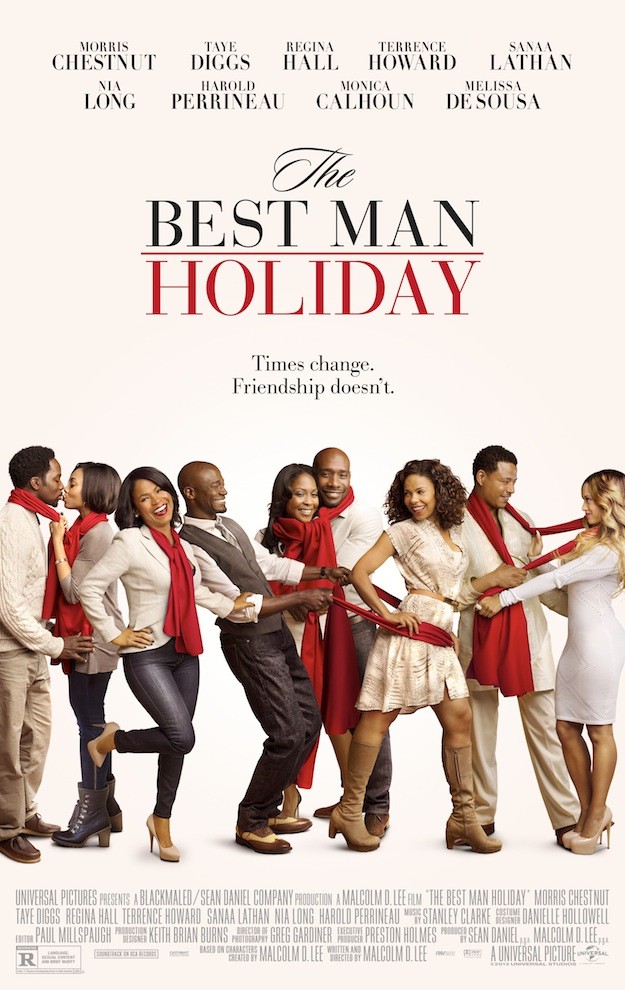The Best Man Holiday
 The Best Man Holiday
The Best Man Holiday
Directed by: Malcolm D. Lee Cast: Taye Diggs, Morris Chestnut, Monica Calhoun, Regina Hall, Harold Perrineau, Sanaa Lathan, Terrence Howard, Nia Long Running Time: 2 hrs Rating: R Release Date: November 15, 2013
PLOT: Struggling writer Harper (Diggs) reunites with his friends during Christmastime at the house of distant pal/football star Lance Sullivan (Chestnut).
WHO'S IT FOR? Not just fans of the original. Also, those who like to see films that provide full entertainment experiences.
OVERALL
Writer/director Malcolm D. Lee understands American audiences in a way more directly comparable to Bollywood films than homegrown multiplex products. First, he certainly recognizes that it all begins with beautiful looking leads, of alpha charisma, in both genders; actors that can carry characters beyond general archetype with their undoubtedly movie-star good looks, taking audiences to a setting of unquestionable wealth (most of the film takes place within Lance's swanky mansion). Lead Diggs, for example, is a great alpha male who has the daffiness usually saved for a side character; he is complemented well by his shadow Lance, played by Chestnut to be the film's perfect specimen — the richest, and the most shirtless.
These men are joined by goofier male friends (including Harold Perrineau and Terrence Howard), and by women who aren't always given the most from Lee's male-centric script, but have the skill from previous films to make their small moments work. Regina Hall has a striking confrontation when confronting Perrineau's shallowness, exposing a subplot for its truer darkness that originally languished as a joke within the film for an hour. The Best Man Holiday's features its strongest performance with its most risky character, in which Monica Calhoun's Mia slowly and gracefully takes audiences lower and lower into the film's tragedy.
With these players in place, Lee also recognizes that when making something that is silly, familiar, and broad, it might as well become an event that has everything, striving for full entertainment experience. Lee packs his Christmastime reunion sequel to a 1999 film that to have everything but an actual wedding - song, dance, football, new life, tragedy, women fights, male fights, friendly bonding amongst both genders, and more. With all of these together, the familiar elements certainly don't make for a familiar experience, or a light one, as each sequence of definitive emotions plays out in full, like musical numbers. Characters arcs are elaborated on very slowly, with drama balanced with calculated, obvious, if not self-aware, comic relief. Even the dialogue of the film hints bluntly like that from Bollywood films, in which characters make their points to the most simplified level.
This is classic mass-audience moviemaking, and it is done with a striking amount of tact from Lee. But certainly in the process of such assembly, parts of his film are cheapened, or oversimplified. Some situations are ridiculous in the plainest of definitions, in which human logic is violated so that another next thing can happen. Thankfully, Lee handles his biggest dramatic weight without the same type of cheapness than can come in his lover's scuffles. Moments of relationship drama can be comically abrupt, with characters undergoing an apparently serious separation in one scene, and then reunited in the next.
The movie does have a striking sense of shallowness to it as well, its idea of high fashion caught up with the necessity to be a part of the celebrity sphere. Within this movie's fantasy is every character's having an importance because they know someone famous, either by their own success, or simply because they are staying at Lance's house. The montage in the beginning often introduces us to the success of these characters by showing news clips, or even more frustratingly, their presence with celebrities. Even Howard's stoner bachelor earns the association of success when he is shown with Quincy Jones, etc.
There is nothing to excuse, however, for a disturbing moment in which Nat King Cole's classic version of "The Christmas Song" is shown accompanying images of characters having sex. Why this song and not one of the zillion other Christmas tunes that appear in the soundtrack?
FINAL SCORE: 6/10